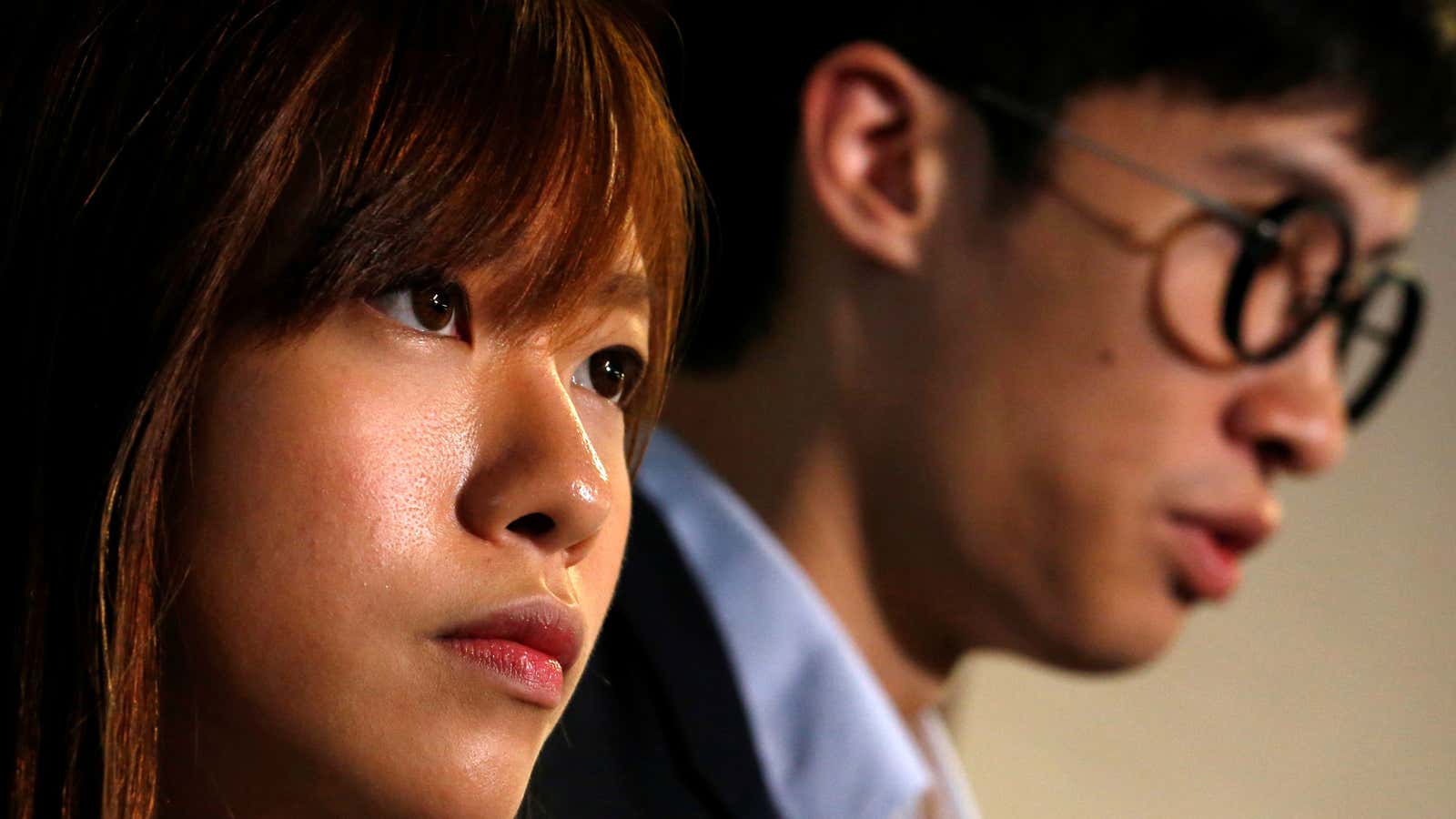China’s top law-making body issued a rare interpretation of the Basic Law that governs Hong Kong on Monday (Nov. 7) that effectively ousts two democratically elected officials from office permanently. The action by Beijing, which has increasingly tightened its grip on free speech and demonstrations in Hong Kong after 2014’s Umbrella Movement protests, could spark widespread protests in a city where demonstrators have already taken to the streets over the issue.
Yau Wai-ching and Baggio Leung, who represent the Youngspiration political party, won seats in September elections to Hong Kong’s Legislative Council (LegCo), but after using a derogatory term to refer to the mainland and declaring Hong Kong was not part of China during their swearing-in session in October, were barred from office. The Hong Kong government has legally challenged the validity of their oaths, but the interpretation by Beijing effectively supersedes Hong Kong’s local judicial system.
The interpretation, issued by Beijing’s National People’s Congress Standing Committee on Monday morning, states that when assuming office, lawmakers and principal officials others must “correctly, completely, and solemnly” swear according to the scripted oath, including the part saying “I will uphold the Basic Law of the Hong Kong Special Administrative Region of the People’s Republic of China and bear allegiance to the Hong Kong Special Administrative Region of the People’s Republic of China.”
If lawmakers reject the oath in that form or take the oath “not genuinely or solemnly,” they will be deprived of their right to assume office—and there’s no chance to retake the oath.
Even more alarming, during a press conference about the NPC’s decision, Li Fei, the NPC’s Basic Law Committee chairman, said that even the idea of “self-determination” amounts to a call for independence.
Here’s the interpretation by the NPCSC, translated from Chinese by Quartz:
1. The provision of Article 104 of the Basic Law of the Hong Kong Special Administrative Region of the People’s Republic of China regarding the “upholding of the Basic Law of the Hong Kong Special Administrative Region of the People’s Republic of China and swearing allegiance to the Hong Kong Special Administrative Region of the People’s Republic of China” is both the statutory provision of the oath that is stated in the Article, and the legal requirement and condition of persons elected or assuming office of public service posts listed in the Article.
2. The provision of Article 104 of the Basic Law of the Hong Kong Special Administrative Region of the People’s Republic of China regarding the related public official “must, in accordance with the law, swear” when assuming office means as follows:
(1) Swearing-in is a statutory condition and a necessary procedure for the inauguration of public officials listed in the Article.
Without taking a lawful and effective oath, or by refusing to take an oath, public officials are not allowed to take office of the corresponding public service posts, and are not allowed to exercise the corresponding powers of office and enjoy the corresponding rights.
(2) Swearing-in must be in accordance with the statutory requirements of format and content. Oath-takers must sincerely and solemnly take the oath, and must correctly, completely, and solemnly swear the statutory oath including “upholding the Basic Law of the Hong Kong Special Administrative Region of the People’s Republic of China and swearing allegiance to the Hong Kong Special Administrative Region of the People’s Republic of China.”
(3) Oath-takers will be deprived of their right to assume their corresponding offices if they refuse to take the oath. Oath-takers who intentionally take an oath that is not consistent with the statutory oath, or take the oath in any insincere or not solemn way, also count as a refusal to take the oath and are therefore deemed invalid. Oath-takers will thus be disqualified for assuming the corresponding offices listed in the Article.
(4) Oath-taking must be conducted in the presence of a lawful administrator of oaths. The administrator of oaths is responsible for ensuring the oath-taking is being carried out legally. The administrator of oaths should declare the oath valid if it is accorded with the laws of the Hong Kong Special Administrative Region, and declare the oath invalid if it is not. The administrator of oaths should not rearrange any oath-taking.
3. The oath-taking stated by Article 104 of the Basic Law of the Hong Kong Special Administrative Region of the People’s Republic of China is the legal commitment from public officials listed in the Article to the People’s Republic of China and the Hong Kong Special Administrative Region, and is legally binding. Oath-takers must sincerely believe in and strictly comply with the statutory oath. Oath-takers who take false oaths or engage in activities in violation of the oath after taking the oath will assume legal responsibility in accordance with laws.
